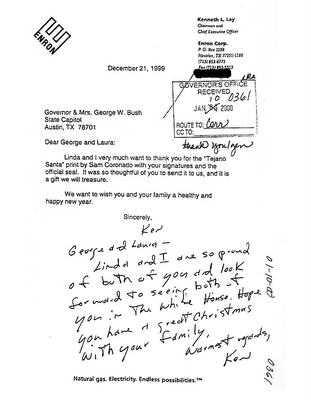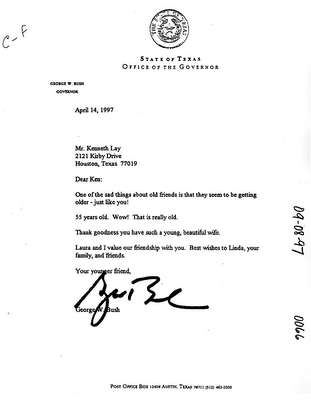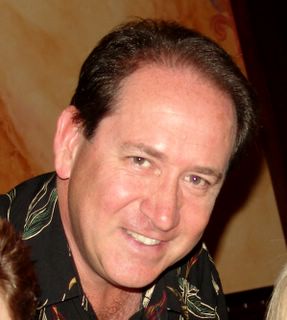Forgive Ken Lay


When former Enron CEO Ken Lay lied about the solvency of Enron, he caused thousands of employees who had their entire financial futures and security tied up in the company to lose everything. The utter calamity of such a tremendous loss is impossible to comprehend. Retirement funds, pensions, jobs and future potential earnings were wiped out within months. Along with his head financial officer, Jeffrey Skilling, Lay was to blame for the misfortunes of many fellow human beings.
In the years subsequent to the bankruptcy of Enron, and the beginning of the trial on indictments against Skilling and Lay for their immense corporate wrongdoing, the image of Lay gained more and more press coverage. He was a wheeler-dealer at the top of the business world. President Bush wrote personal jovial notes addressed to “Kenny Boy.” Lay spent millions of dollars on one birthday party for his wife. And most vividly, he seemed put-upon and put-out by the charges that he hid the problems of Enron from everyone, and that in fact he was unaware of any accounting transgressions which led to the downfall of the company, because he was above and beyond the morass of daily details and was too busy running the company. He was on a personal cause to prove his innocence, and get on with his retirement with the tens of millions of dollars he had stashed from his corporate raiding.
That attitude of “who, me? Guilty of what?” was very clear as the verdict of guilty on all six counts was announced, and the blood visibly drained from Kenny Boy Lay’s face. He was more shocked than anyone that the best attorneys money can buy failed his fate, and now he was destined to being sentenced to years in prison.
So while Ken Lay went off to his vacation home in Colorado for some temporary r & r, his fate caught up with him, and 41 days after his verdict, 60 days prior to his sentencing date, he had a massive coronary heart attack and died this morning at 3:15 in a hospital in Aspen, CO. “ ‘Apparently, his heart simply gave out,’ said Pastor Steve Wende of Houston's First United Methodist Church.” That would appear to be about right—apt imagery, no doubt.
The more important issue in this news story is the enormous impact of Lay’s crimes on the thousands of people who worked in his company. They are the living, and the ones who have to move ahead on their altered financial paths due to the greed and immorality of a now dead employer. In these people’s lives, would there ever be any room to forgive such a horrendous man? Is forgiveness even part of any plan to move on? And what about all of us who see the events unfolding—do we need to reflect on what happened and think about forgiveness as well?
As I am untouched by the actions of Lay and Skilling and the fall of Enron, the reader may ask who I am to make any such judgment. My answer is that I am not judging the actions of other people. What moral person who knows the facts of the Enron debacle can condone the deceitful, illegal, and ultimately catastrophic actions of greed and dishonor by Skilling and Lay? The mentality that allowed not only the bloating of a company for the financial aggrandizement of a few, but the ability of those few to act in denial of what they did and continue to go about their free-wheeling lifestyles, which no doubt included sleeping well at night—where that mentality was fostered and nurtured is a key ingredient to learning from, and doing better in light of, these criminals’ wrongdoings.
Ultimately, seeing through the wrong actions, which again we don’t condone, to the individuals behind them, who are fellow human beings—like it or not—we can begin to forgive them as fellow humans, even though we do not forgive the actions. If this sounds like gimmicky semantic claptrap, think again about the motive of forgiveness. Ken Lay is dead—he won’t get anything out of us forgiving him for what he did, except in a spiritual sense. It is US who will gain an advantage on the dark side that exists in us all—we will have a chance to reflect and look into ourselves, and wonder about how much it was worth to Ken Lay to do what he did, which he refused to think was wrong, and then finally die because of it. We will be better off for forgiving him even though we believe he won’t know a thing about it.
27 years ago I was present at a speech given by the famous Nazi war criminal hunter, Simon Weisenthal. Mr. Weisenthal was more than just a bounty hunter. He lost his entire family in the murderous actions of Nazi Germany we know as the Holocaust. The speech he gave in Los Angeles so many years after the activities happened of which he was recounting, was still rivetting and illuminating. One thing he said I will never forget, was that he was present when a Nazi war criminal was dying. I don't remember if he had been shot during the war or if he was incarcerated afterwards--this detail doesn't matter. The point was that the Nazi was dying, and he held out his hand to Weisenthal, who grasped it, and he said, "Forgive me."
Weisenthal simply said in his speech that he could not forgive this man, and the Nazi died holding his hand, in silence. At that time listening to Mr. Weisenthal talk, about his mother being taken away in a cattle car right in front of him, and of later finding out his entire family was killed by the Nazis--I thought damn right--forgive what? Better to damn guys like that to hell and move on.
I think about Weisenthal's story at times because I don't think he took lightly the request of a dying man, a "Christian," who understood the nature of forgiveness based on upbringing, asking the man holding his hand in his own, to forgive him. I think Weisenthal was trying to make a point--that the Nazi understood exactly what he had done, how awful his actions were, and now wanted to save his eternal soul with the forgiveness of a fellow human being. I didn't watch my mother get trucked off to her death when I was nine years old by Nazis, so I can't judge Weiesenthal's reaction to the request for forgiveness, other than to report what he said happened.
The Nazi knew he was wrong--he was condemned in his own mind. I know that now. I didn't think about that or care about it when I was listening to Weisenthal's speech.
Now there is the Ken Lay predicament--and he knew he was wrong and did NOT ask for forgiveness. And there are thousands of people, families, lives that have been screwed up in the worst way by this guy.
The motives behind the illegal actions of Lay and Skilling derive from a society which in the end, must condone such actions, or these two men wouldn’t have thought it was OK to do what they did. What else allows Bush to send armies across the sea to occupy a foreign land in the name of fighting an unseen monster—terrorism—unless the society behind him says it’s OK to do this?
Children are brought up to believe that it’s a “dog-eat-dog” world—that there’s not enough to go around. They are taught a perverse version of social Darwinism, that “survival of the fittest” means that some will make it at the expense of others, and those who are more aggressive and act faster will be among the haves, and those who sit back and wait will be the have-nots. I was told in my teen years that I didn’t have enough “larceny in my blood,” which I concluded meant that I was not man-enough to make a good living because I was unable to face hurting my fellow man or woman in order to get ahead.
What do those who teach such things expect from the product of that teaching?
Michael Josephson, founder of the Josephson Institute of Ethics, teaches corporations and individuals world wide how to conduct business on the up and up, and that this is more profitable in the long run. The Institute’s mission statement, “To improve the ethical quality of society by changing personal and organizational decision making and behavior,” has been proven to work over and over again.
My children have gotten certificates from the Institute through their schools that say “Character Counts.” They understand what I have learned and believe—that our character is the only thing we really own, and over which we have complete control.
All corporate leaders don’t work with the lack of values of Ken Lay and Jeffrey Skilling. Jack Welsch, former head of General Electric and the most successful CEO of all time, said in a recent interview that Lay and Skilling were aberrations, and that truly successful businesses are conducted within the law and morality.
On the day “Kenny Boy” Lay goes off to his final freedom, there is great hope in the lessons learned from his mistakes. So I forgive him in the end, while not condoning what he did, because our knowing how he conducted his mission, for which he paid the biggest price, may hold a brighter future for those who aspire to corporate greatness in the future. And he was, after all, made of the same DNA as me.

No comments:
Post a Comment
Comments signed Anonymous will not be published.